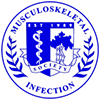Authors: Rao N, Regalla D
Title: A prospective study evaluating the efficacy of daptomycin for the treatment of prosthetic joint infections (PJI).
Address: UPMC Presbyterian Shadyside, School of Nursing Building, Second Floor
5230 Centre Avenue, Pittsburgh, PA 15232-1381
Purpose: To evaluate the efficacy of daptomycin in the treatment of prosthetic joint infections (PJI).
Methods: Twelve adult patients with PJI due to resistant gram-positive organisms were prospectively enrolled between June 2004 to January 2005 for treatment with daptomycin at 4 mg/kg/day. All patients had clinical evidence of infection confirmed by positive intra-operative bone and tissue cultures. Follow-up for each patient was conducted 5 weeks after the start of treatment and every 2 months thereafter for monitoring of side effects, compliance, and evidence of recurrence. Success of therapy was defined as no clinical evidence of recurrence with continued improvement of joint function. Failure of therapy was defined as clinical evidence of recurrence and a positive culture for the same organism after cessation of therapy. Appropriate surgical intervention was carried out and followed by orthopedic surgeons.
Results: There were 12 patients, 7 (58%) females and 5 (42%) males, (mean age 70 years; range 55-83). Infected prosthetic joints included 9 total knees, 2 total hips, and 1 total shoulder. Eight of the 12 patients had hardware removed, while 4 had retention of hardware due to acute PJI. Pathogens identified were methicillin-resistant staphylococcus aureus (MRSA) 7 (59%), coagulase-negative staphylococcus 4 (33%), and methicillin-sensitive staphylococcus aureus (MSSA) 1 (8%). Duration of treatment ranged from 6-12 weeks with a mean of 6.5 weeks. Follow up ranged from 0-9 months with a mean of 5 months. There were a total of 6 successes and 5 failures, with one additional patient dying of an unrelated cause shortly after 6 weeks of antibiotic therapy. Three of the 5 failures had hardware removed prior to treatment, while 2 of the failures had retention of hardware. The pathogen involved for each of the 5 failures was MRSA. No patient had cessation of therapy due to an adverse side effect.
Conclusion: The efficacy of daptomycin in the treatment of prosthetic joint infections is uncertain. Further data is needed with respect to bone penetration and dosing.
Significance:

